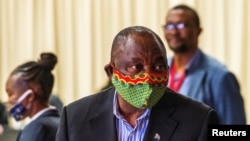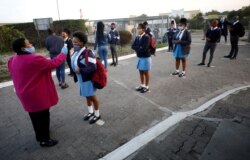South Africa will close most public schools for a month and extend the 2020 school year into 2021, Cyril Ramaphosa said Thursday, as the nation’s case burden of coronavirus grows past 400,000 – Africa's highest infection number.
School’s out for August, and the academic year will be extended through 2021, South Africa’s president announced late Thursday -- a move affecting more than 14 million children and the adults who care for them.
The order covers government schools, not private schools, though many private schools are also closed. Most schools have been closed since the nation declared a state of disaster in March and imposed a strict nine-week lockdown. Public schools restarted for seventh and 12th grade students in June but many were forced to close again after 775 schools experienced viral cases.
Ramaphosa explained his decision, which was supported by teachers’ unions.
“We have taken a deliberately cautious approach to keep schools closed during a period when the country is expected to experience its greatest increase in infections," said Ramaphosa. "... I am aware that this arrangement that I’ve just announced will disappoint many learners who want to be back at school and may cause inconvenience and difficulty for many families who need to make alternative child care arrangements. We ask you to do this because we believe it is important to ensure that schools do not become sites of transmission at a time when infections are rising fast.”
He stressed that the national school feeding program, which covers 9 million children, will continue to provide meals for collection.
Ramaphosa, who stunned the wine-producing nation two weeks ago by announcing a sudden ban on all alcohol sales, also announced a $30 billion aid and stimulus package. He then admonished those who abuse the system.
“What concerns me, and what concerns all South Africans, are those instances where funds are stolen, where they are misused, where goods that we have to procure are overpriced, where food parcels are diverted from needy households – where there is corruption and mismanagement of public funds," said Ramaphosa. "… From the outset of our response to the pandemic, we have been quite clear that there should be no scope for corruption in the use of these public resources. More so than at any other time, corruption puts lives at risk.”
Ramaphosa did not give details on how the school year will be extended into next year. South African schools are aligned with the calendar year, with the school year beginning in January and ending in December. Moreover, Ramaphosa added, grades 12 and 7 will be exempted from the four-week break, with grade 12 taking one week off and grade 7, two weeks.
The decision drew swift condemnation from the opposition Democratic Alliance, with party leader John Steenhuisen saying “this decision is not supported by the best available evidence, it is not supported by education experts, and it is not supported by the virus data.”
In addition, education and human rights advocates say they worry that this prolonged absence could lead to other problems, such as psychological stress and increased risk of abuse at home.
Your correspondent did not have to go far to hear from overburdened parents, many of whom have struggled to work from home since late March while their increasingly feral children bounce around the house, leaving a trail of impressionist crayon art, dirty cups and discarded socks. In fact, if someone would please stop pulling Mommy’s hair for just a few minutes, she can finish writing this radio story.





